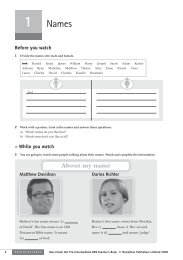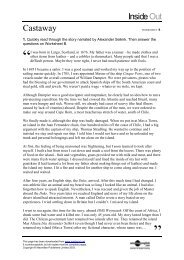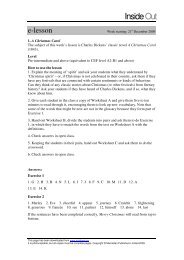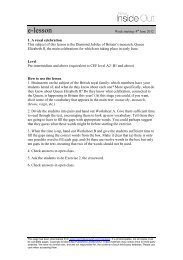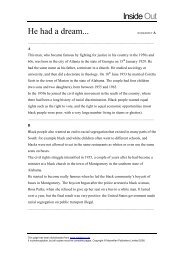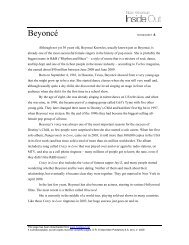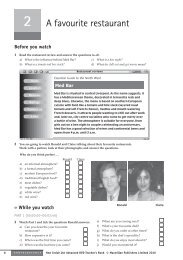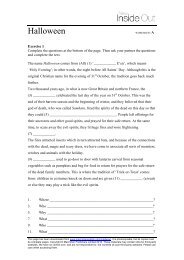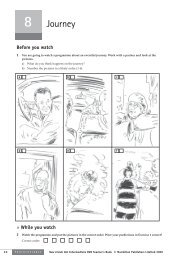5 Schooldays - Inside Out
5 Schooldays - Inside Out
5 Schooldays - Inside Out
Create successful ePaper yourself
Turn your PDF publications into a flip-book with our unique Google optimized e-Paper software.
5 <strong>Schooldays</strong><br />
Teacher’s notes<br />
Summary<br />
This DVD programme can be used as support to materials in Unit 8 of the Student’s Book.<br />
It is a documentary about two generations of a family from a village in the Midlands,<br />
in the centre of England. The parents went to the same school as their children.<br />
Language focus<br />
Grammar: present simple and past simple; modal<br />
structures: obligation and permission<br />
Vocabulary: cane, cap, chew gum, detention,<br />
dressmaking, homework, lines, punishment, ruler,<br />
school rules, school uniform, shorthand and<br />
typing, slipper<br />
Lines is a form of punishment where the student<br />
has to write the same sentence many times.<br />
Yellow sheet is a written warning from the teacher.<br />
It’s yellow to show the seriousness of the offence.<br />
Detention is a common form of punishment in<br />
modern British schools. Students have to stay in a<br />
classroom under supervision for a fixed period of<br />
time, usually after school.<br />
Background information<br />
Comprehensive schools were introduced in the UK<br />
about the time the parents in this programme went to<br />
secondary school. The comprehensive school system<br />
was based on the principle that children of all abilities<br />
could study together in the same school (and often in the<br />
same class). The main differences between the parents’<br />
experience of education and that of their children is in<br />
the range of school subjects, the specialisation of boys<br />
and girls into different subjects, and the approach to<br />
discipline. For example, Gillian talks about studying<br />
shorthand and typing and dressmaking. These two<br />
subjects were considered necessary to prepare girls both<br />
for secretarial work and home-making. Now boys and<br />
girls all study the same subjects.<br />
Language notes<br />
Would occurs when the adults talk about their<br />
past experiences. It is used to talk about habitual<br />
actions in the past.<br />
Shorthand was more commonly used in the<br />
past. It is a written code used by secretaries<br />
and journalists to transcribe dictated letters and<br />
interviews. They can then write up the text in full<br />
later on.<br />
Ruler, slipper, cane are all forms of corporal<br />
punishment that were used in the past. In Britain<br />
today, physical punishment has been abolished in<br />
schools.<br />
Procedure<br />
Before you watch<br />
1 Put the students into groups and tell them to discuss<br />
the questions. If some students are still at school you<br />
could ask them to talk about their earlier school years.<br />
While you watch<br />
Part 1 (00:00–01:07)<br />
2 Play Part 1 and tell the students to complete the<br />
family tree with the names in the box and the ages<br />
of the children.<br />
a) John b) Pauline c) Tom<br />
d) Connie e) 14 f) 12<br />
g) 14 h) 12<br />
<strong>Schooldays</strong><br />
P R O G R A M M E 5<br />
29
Optional extension<br />
To provide practice of family vocabulary ask the<br />
students to answer the following questions.<br />
a) Which two of the adults are related by birth?<br />
b) What are the relationships between the eight<br />
members of the two families?<br />
Example: Claire is Gillian’s daughter .<br />
1) Gillian is Tom’s and Luke and<br />
Connie’s .<br />
2) Jeff is Connie’s and Tom and Claire’s<br />
.<br />
3) Tom is Claire’s .<br />
4) Connie is Luke’s .<br />
5) Luke is Jeff’s .<br />
6) Tom and Luke are .<br />
7) John is Gillian’s and Pauline’s<br />
.<br />
8) Pauline is Jeff’s and John’s<br />
.<br />
Play Part 1 again if necessary so that they can check<br />
their answers.<br />
Part 3 (03:07–04:38)<br />
4 Ask the students to read the text and complete the<br />
school rules using the words in the box.<br />
a) stand f) hit<br />
b) smoking; walk g) lines<br />
c) wear h) move; ring<br />
d) gum i) hour’s<br />
e) arrive; uniform<br />
Ask the students to watch Part 3 and check their<br />
answers.<br />
Part 4 (04:39–06:18)<br />
5 Before watching Part 4, ask the students to read the<br />
sentences and guess the correct options. Then play<br />
the programme and tell the students to check their<br />
answers.<br />
a) enjoyed b) fast c) had to d) have to<br />
e) can sometimes f) will probably<br />
a) John and Jeff. They are brothers.<br />
b) 1) mother; aunt<br />
2) father; uncle<br />
3) brother<br />
4) sister<br />
5) son<br />
6) cousins<br />
7) husband; brother-in-law<br />
8) wife; sister-in-law<br />
If there is time, let the students watch the complete<br />
programme at the end so they can enjoy the<br />
whole film.<br />
After you watch<br />
6 Put the students into pairs and ask them to say what<br />
is similar and different in the parents’ and children’s<br />
experience of school.<br />
Part 2 (01:08–03:06)<br />
3 Give the students a few minutes to read through the<br />
statements. Then play Part 2 and tell the students<br />
to decide whether the statements are true or false.<br />
You could ask them to try and correct any false<br />
statements.<br />
a) T<br />
b) F (she did like her)<br />
c) F (it’s PE)<br />
d) T<br />
e) F (Connie doesn’t study dressmaking or<br />
shorthand and typing. However, she does<br />
study modern languages, geography and<br />
sport which Gillian didn’t study.)<br />
f) T<br />
g) T<br />
h) T<br />
Possible answers:<br />
Differences: punishments, meals, school<br />
subjects, school rules<br />
Similarities: homework, uniforms<br />
7 Put the students into groups and ask them to<br />
compare their own experiences with the people in<br />
the programme. Offer them examples from your<br />
own schooldays.<br />
30 P R O G R A M M E 5 <strong>Schooldays</strong>
5 <strong>Schooldays</strong><br />
DVD script (06:18)<br />
(N = Narrator; I = Interviewer; J = Jeff; Jo = John;<br />
P = Pauline; G = Gillian; T = Tom; L = Luke;<br />
C = Claire; Co = Connie)<br />
Part 1 (00:00–01:07)<br />
N: The beautiful village of Helmdon is in the<br />
Midlands, in the heart of England. People have<br />
lived here for generations and many of them<br />
work on farms. It’s a small community with a<br />
church and a pub.<br />
This is Tom and his sister, Claire. And this<br />
is Luke, and his sister, Connie. The boys are<br />
fourteen and the girls are twelve. They all go to<br />
Magdalene College School, which is just outside<br />
the village.<br />
And these are Tom and Claire’s parents, Gillian<br />
and John. And John’s brother Geoff, and his wife<br />
Pauline, who are Luke and Connie’s parents.<br />
And all the parents went to the Magdalene<br />
College School too.<br />
Part 2 (01:08–03:06)<br />
What do the children think about their school,<br />
and how has it changed since their parents were<br />
there?<br />
I: What was your favourite subject at school?<br />
G: History.<br />
I: Why?<br />
G: Because I enjoyed it the most. I found it the most<br />
interesting.<br />
Jo: History, because I liked the teacher.<br />
P: Typing and shorthand, because I had a lovely<br />
teacher. She made it very enjoyable.<br />
J: Mathematics, because I enjoyed it.<br />
T: PE. I like sport.<br />
C: English.<br />
L: Music. I like playing the guitar.<br />
Co: Art. Because I’m probably the best at art and I<br />
like drawing.<br />
I: What subjects did you study?<br />
G: English, English language and English literature,<br />
history, science, maths, dressmaking, shorthand<br />
and typing.<br />
Co: Maths, English, modern languages, science,<br />
geography, history, sport, and I can’t think of<br />
any others.<br />
I: Do you like your teachers?<br />
Co: Some are OK, but some are just really horrible.<br />
L: Yeah, I like them. They’re cool.<br />
I: Who was your favourite teacher?<br />
J: My French teacher.<br />
I: Why?<br />
J: Because he only had one arm and I admired him<br />
as a man.<br />
Jo: Mr Beresford.<br />
I: Why?<br />
Jo: Because he was a very good teacher.<br />
I: Who’s your favourite teacher?<br />
C: I don’t really have a favourite teacher.<br />
L: Mr Blunsdon.<br />
I: Why?<br />
L: Because he teaches my favourite subject.<br />
I: Which is?<br />
L: Music.<br />
Co: My RE teacher because he’s fun and he’s really<br />
nice as well.<br />
Part 3 (03:07–04:38)<br />
I: What were the school rules like?<br />
G: You had to stand up as soon as the teacher came<br />
into the room, and again when they left.<br />
P: No smoking. No alcohol on the premises. Um,<br />
do not run, always walk.<br />
J: You had to wear your cap from the moment you<br />
left your home in the morning until the moment<br />
you got home at night.<br />
C: You’re not allowed to, like, chew gum. Um,<br />
you’ve got to obey the teachers.<br />
Co: You have to arrive on time with everything<br />
you need. And no running, pushing. Um, no<br />
chewing gum, and you have to wear set school<br />
uniform.<br />
I: What were the punishments?<br />
P: The punishments were more physical than they<br />
are today. A teacher would shout at you, maybe<br />
even hit you. If you’d behaved really badly<br />
you’d be sent to the Head and you’d get a ruler<br />
over the palm of your hand.<br />
J: You were given lines or you had the slipper, or<br />
you had the cane.<br />
New <strong>Inside</strong> <strong>Out</strong> Pre-intermediate DVD Teacher’s Book © Macmillan Publishers Limited 2008<br />
P H O T O C O P I A B L E<br />
31
Co: They’ll tell you off and then they might move<br />
you and then yellow sheet, then breaktime<br />
detention, lunchtime detention, then after school<br />
detention, then they might ring home.<br />
I: Did you have to do homework?<br />
Jo: Yes, we did. About 90 minutes.<br />
T: Yes, you do have to do your homework. If you<br />
don’t, you’ll get a detention. You’re meant to do<br />
an hour’s homework every night.<br />
Part 4 (04:39–06:18)<br />
I: What were your school dinners like?<br />
Jo: Excellent.<br />
I: What did they consist of?<br />
Jo: A meat and two veg, followed by a pudding.<br />
P: Delicious. They were very traditional: potato,<br />
meat pie and a nice pudding.<br />
C: You can get stuff like chips, burgers, hotdogs,<br />
sometimes pasta or sausages or baked beans.<br />
I: Did you have to wear a school uniform?<br />
P: Yes, I did. The summer uniform was a blue<br />
cotton dress.<br />
J: Yes, we did. Black shoes, black socks, black<br />
trousers, grey shirt, tie, black jacket and a cap.<br />
T: You have to wear a school uniform all year<br />
round. It’s quite nice in the summer because it’s<br />
no ties and you’re sometimes allowed to wear<br />
trainers.<br />
Co: Erm, in the winter you wear black trousers with<br />
a shirt and tie and school jumper. And in the<br />
summer you wear black trousers, or girls can<br />
wear a skirt and polo shirt. And then if you get<br />
cold, a school jumper.<br />
I: Do you think your children will go to the same<br />
school?<br />
T: Yes, I think they will.<br />
C: Maybe.<br />
L: I’d like them to, considering I’ve been and my<br />
parents have been, so, yeah. It would be cool.<br />
Co: I don’t know. Um, if we live near here, then,<br />
yeah.<br />
32 P H O T O C O P I A B L E New <strong>Inside</strong> <strong>Out</strong> Pre-intermediate DVD Teacher’s Book © Macmillan Publishers Limited 2008



